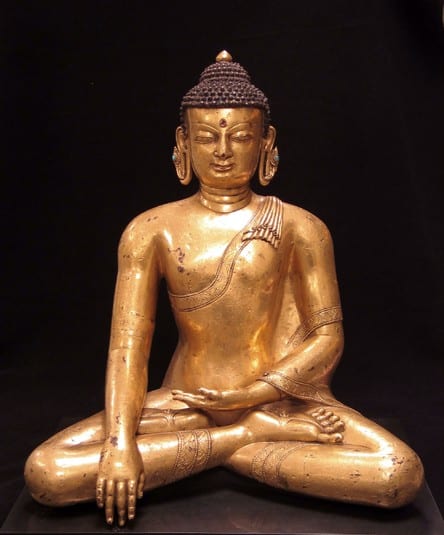All Buddhist traditions emphasize the importance of cultivating these positive mental states known as the four immeasurables, or the four boundless, or unbounded, attitudes. The foundational vehicle’s Mettanisamsa Sutta (SN 46.54) describes these as the “four dwellings of Brahma”. They are unbounded because they literally cannot be measured.
As concentration methods, these contemplations emerged in pre-Buddhist spiritual communities in India. The Buddha, however, urged his followers not to cling to the notion of “abiding with Brahma” for such a goal would lead only to rebirth in a divine realm.1Digha Nikaya II.251 Thus in Buddhist teachings, these contemplations were to be practiced along with the teachings on impermanence, non-self, and suffering. With this proper foundation, the four immeasurables brought lasting benefits.
These four immeasurables are:
- Equanimity or Impartiality (Tibetan བཏང་སྙོམས་, tangnyom) is the wish that all living beings may be free from the attitude of attachment to some and aversion to others.
- Loving Kindness (Tibetan བྱམས་པ་, jampa) is the wish that all living beings may have happiness and its causes.
- Compassion (Tibetan སྙིང་རྗེ་, nyingjé) is the wish that all living beings may be free from suffering and the causes of suffering.
- Joy (Tibetan དགའ་བ་, gawa) is the wish that all living beings may live in happiness and that their happiness continues to expand.
In the foundational vehicle, these attitudes are cultivated as the concentrative practices known as the jhanas. In that tradition, equanimity is attained only at the fourth level of concentration.
The Mahayana perspective presents these four attitudes as the core foundation for training in bodhicitta. In this system, the practitioner is usually encouraged to begin by developing equanimity. The 13th-century Tibetan master Longchen Rabjam (Longchenpa) (1308–1363) noted that the order is not necessarily fixed. He commented, “In the meditation on them there is no fixed order. Beginners on the other hand should start with training in impartiality (equanimity). Once they realize the equality of being who are close and far, they should proceed to meditate upon the other three”.
Longchenpa also distinguished between previous concentrations on the divine abidings and practices dedicated to a higher purpose. He wrote:
If love, compassion joy, impartiality are not connected with the path to liberation,
Longchenpa, Finding Rest in the Nature of Mind, Padmakara Translations, Shambhala, 2017.
They are the four divine abidings, causes of saṃsāra.
But if they are connected with the path that leads to peace,
They lead beyond the ocean of existence.
Thus they are the four unbounded attitudes.
The importance of these contemplations as a preparation for the development of bodhicitta is emphasized throughout the Mahayana and Vajrayana traditions. In particular, these can be stepping stones to the aspiring bodhisattva’s practice of tonglen, or “giving and receiving”.
Longchenpa closes his chapter on the four immeasurables by assuring his readers that this practice brings one closer to the ultimate goal of buddhahood for the benefit of all sentient beings.
Therefore, love, compassion, joy, impartiality
Longchenpa, Finding Rest in the Nature of Mind, Padmakara Translations, Shambhala, 2017.
Are of unbounded excellence, and highly praised
By the unequaled Teacher of both gods and humankind.
Any path that lacks them is mistaken,
They err who have recourse to other teachers.
Embraced by the four boundless attitudes,
The path leads on to spotless liberation.
It is the way that all the buddhas tread,
Earlier and later, past, present and to come.
Image courtesy of Himalayan Art Resources


